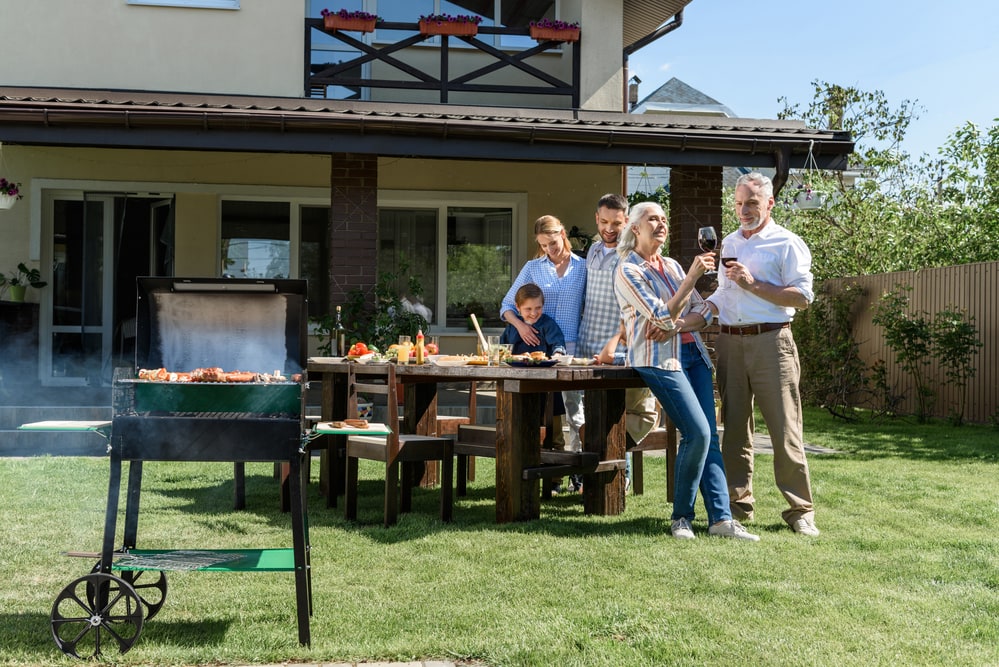You’ll probably attend more barbecues in the coming weeks now that summer has arrived. A barbecue isn’t great unless it includes meat, seafood, and beer, right? These barbecue essentials are delicious, but if you have gout, they may be deadly.
BBQ is one of the best summertime pastimes. You get to catch up with loved ones, eat delectable food, and relax in the backyard. Few things beat a summer evening spent with a steak, chicken breast, a few beers, and good company.
Without a doubt, grilling outside is one of life’s pleasures. However, if you’ve been on a diet, the temptation to indulge in some hearty food and drink can be especially strong. Binge eating and drinking may have serious consequences if you have gout.
Gout may occur after a grilled meal due to the amount of food and beverages we typically consume—significantly more than we would at home. As a rough guideline, we eat up to 10% more food than usual for each person present.
Two servings of food, two to three beers, and dessert are typical of a grilled meal. You could even sip a few glasses of whiskey to round it out. Therefore, we may eat a very large portion of food over several hours and do so more quickly than if we ate the same amount at home.
Gout Is an Inflammatory Condition
Gout is an inflammatory disease caused by an excess of uric acid (a bodily waste product) in the bloodstream, resulting in the formation of sodium urate crystals in certain joints. The pain will almost certainly be excruciating in the first four to twelve hours. Some joint discomfort may last for a few days to a few weeks after the most severe pain has subsided.
Gout occurs when the body produces too much uric acid or fails to eliminate enough uric acid through urination or bowel movements. Gout often begins with excruciating pain and swelling in the big toe, and it may be caused by any type of trauma, such as an illness or injury.
Uric acid is a waste product that naturally occurs in the body. It is produced when purines, which are chemicals, degrade. Uric acid dissolves in a healthy person’s blood and is eliminated by the kidneys through the urine.
However, your kidneys may produce too much uric acid, or your body may excrete too little. A joint or the tissue surrounding it may develop sharp, needle-like urate crystals as a result of uric acid buildup, causing swelling, pain, and inflammation.
After that, future attacks may “flare up” in other joints, most notably the foot and knee, before becoming chronic. Once chronic, gout may affect a variety of joints, including those in the hands. This usually takes several years to occur.
When gout is chronic, it causes pain and inflammation in numerous joints and may resemble rheumatoid arthritis in appearance. Pseudogout is a condition in which calcium crystals, not uric acid, form in the joints, causing pain and swelling similar to gout. This is why a thorough medical diagnosis is essential.
Gout Treatment Options
Gout treatment requires a two-pronged approach that combines medications and lifestyle changes. Corticosteroid medications, such as the drug prednisone, may be prescribed by your doctor to control gout inflammation and pain. Medications such as Allopurinol (the most commonly prescribed uric acid-lowering drug) are intended to prevent gout attacks and keep the condition from becoming chronic.
Having said that, we’re talking about how you can have a fun BBQ with your friends and family while lowering your risk of gout flare ups. Our approach entails understanding what you can and cannot do.
Purines: The Real “Culprit” in Gout
Purine compounds may raise uric acid levels, whether produced by the body or obtained through the consumption of high-purine foods. Excess uric acid may cause uric acid crystals to form, which then accumulate in soft tissues and joints, causing the painful symptoms of gout.
Purines are also present in foods such as steak, organ meats, and seafood. Alcoholic beverages, particularly beer, and drinks sweetened with fruit sugar are other foods that raise uric acid levels (fructose).
Because this condition is known as the “disease of kings” or “rich man’s disease,” you may be able to attribute your increased risk to a more opulent lifestyle. When you spend time with friends and family barbecuing in parks and backyards, you’re probably (like most people) putting healthy eating on the back burner.
If you’ve previously suffered from gout, avoiding purine-rich foods may help you avoid another attack. When it comes to cookout food, however, this is sometimes easier said than done. How about some tips for having a good time at a picnic while suffering from gout?
With a little planning, attention to your dietary choices, and perseverance, you can have a fantastic summer with your friends and family in no time.
All it takes is a little proper treatment. You’ll be surprised at how gout may be controlled and future attacks avoided. Incorrect diagnosis and noncompliance are the most significant barriers to gout control. You are entirely responsible for noncompliance. Do the right thing and eat smart at the cookout.
Here’s an overview of the types of foods that may potentially trigger a gout flare-up if you’re not careful.
Foods with a high purine content
- Purines are found in high concentrations in organ and glandular meats such as the liver and kidney.
- Red meat includes beef, lamb, and pork.
- Seafood includes anchovies, shellfish (particularly shrimp), sardines, and tuna
What might trigger a gout attack?
- Sugar-sweetened beverages
- Alcohol: distilled spirits and beer
- Dehydration
Foods That Are Beneficial to Gout Patients
- Caffeinated coffee should be consumed in moderation.
- Cherries: cherry juice is also delicious.
- Even though vitamin C is not a food, it appears to be a useful gout supplement.
How to Prevent Gout Symptoms From Ruining Your BBQ
There are some simple precautions you can take to stay safe during this season. Here’s how to have a safe (and enjoyable!) summer barbecue season if you have gout.
Tip #1: Watch Your Meat Consumption
It may be tempting to eat the delicious steak that your friends and family have prepared for you, but resist. This is because this type of meat has a high purine content. Purines are broken down by the body into uric acid, and too much of it may cause a gout attack.
Fortunately, you do not have to abstain from all meat! If you have gout, lean meats such as chicken and turkey are ideal because they contain fewer purines than red meat or organ meats.
Serve lean cuts of meat at your next barbecue. This way, you’ll have something to eat. If you’re going to one, let the host know ahead of time or offer to grill the meat you brought! They will appreciate the offer and will be more likely to accommodate your request.
Tip #2: Take Caution When Consuming Seafood
Check to see if there will be seafood served at the BBQ you’re attending. Because it contains a lot of purines, most seafood should be avoided. The worst seafood includes tuna, sardines, anchovies, and shellfish.
High-purine foods contain 150 to 825 milligrams of purine compounds per 100 grams and should be avoided by gout patients. This type of fish includes anchovies, mackerel, herring, sardines, cod, haddock, and trout.
Canned versions of these foods are also prohibited on a gout diet. Purines are found in 480 milligrams per 100 grams of sardines and 378 milligrams of herring.
Fish that do not have a high purine content range in purine content from 50 to 150 milligrams per 100 grams. These are some purine-acceptable fish to consume:
- Salmon
- Canned light tuna
- Flounder
- Sole
- Catfish
Friends and acquaintances with good intentions may encourage you to try them. Even if you are tempted, it is best to politely decline the offer and try one of the other dishes on the menu instead.
Tip #3: Limit Your Alcohol Intake
Beer is commonly served at barbecues, which is fine for most people but not if you have gout! Unfortunately, beer is one of the worst foods for people who have gout. It contains a lot of purines and has been linked to gout attacks.
Drinking 2 to 4 beers per week increases your risk of gout by 25%; drinking 2 beers per day well then you are just asking for a gout attack. Instead of alcoholic fruit punches, bring nonalcoholic fruit punches to the barbecue.
Staying hydrated may help with gout symptoms, so drink plenty of water. It’s crucial to increase your daily fluid intake to at least ten glasses because fluids support the kidneys’ filtering and elimination of uric acid.
Again, you may feel compelled to drink this summer, but that is all it is: compulsion. During the summer, millions of people go without beer. You can simply decline the offer to drink beer, or better yet, bring your own glass.
If you already have a drink in your hand, people are less likely to offer you something you should avoid. Fill your glass with water or any other healthy beverage of your choice. You can even drink wine! Naturally, in moderation. Wine is not as bad as beer and may even be good for your health.
If you must drink, stick to organic varieties and limit yourself to one beer per day. They’re better for you than the majority of mainstream beers on the market today. Both Heineken and Amstel Light are excellent choices.
Tip #4: Avoid Sugary Drinks and Fast Food
If beer is unavailable, you may be served soda or sweetened juice instead. These drinks should be avoided as much as possible because they may raise uric acid levels in your body.
Chips and other junk food are also popular at barbecues. These are highly processed foods that are bad for you and should be avoided at all costs.
The BBQ season can be improved by always keeping wholesome food on hand. When temptation arises, you can always reach for a healthy meal or snack to satisfy your hunger.
Some healthy gout treatment options include fresh fruits and vegetables, nuts, seeds, eggs, potatoes, yogurt, and coffee.
Tip #5: Drink a Lot of Water
Summer temperatures can be extremely high, causing you to sweat profusely. You’ll need to drink more water to rehydrate. Drinking plenty of water prevents dehydration, which may lead to a gout attack. Water also aids in the diversion of uric acid in the blood, preventing it from accumulating.
Preventing a Gout Attack After a Barbecue
The best way to prevent the onset of gout when eating off the grill is without a doubt to plan ahead of time and set limits so you know when to stop. Don’t eat more meat or fish than you intended; you can compensate for eating less by investing in high-quality meat. To reduce your salt intake, avoid marinated foods and season your food yourself.
Some people believe that only meat should be grilled, not vegetables, but this is a mistaken belief. There are no rules when it comes to grilling vegetables, and almost anything is possible, so take the time to prepare a few tasty vegetarian dishes. Focusing on vegetarian options and salad for an evening meal off the grill is not unsuitable.
Beer and soft drinks may both trigger a gout flare-up, making drinking more difficult. However, you can get creative by making your own lemonade at home with significantly less sugar.
Enjoy Your BBQs While Managing Your Gout Symptoms
Summertime seems like a minefield of things that could cause gout attacks. There is no need to worry, though, if you are ready. To avoid gout attacks this time of year, be careful what you eat and drink at BBQ gatherings and take extra care of your health.

